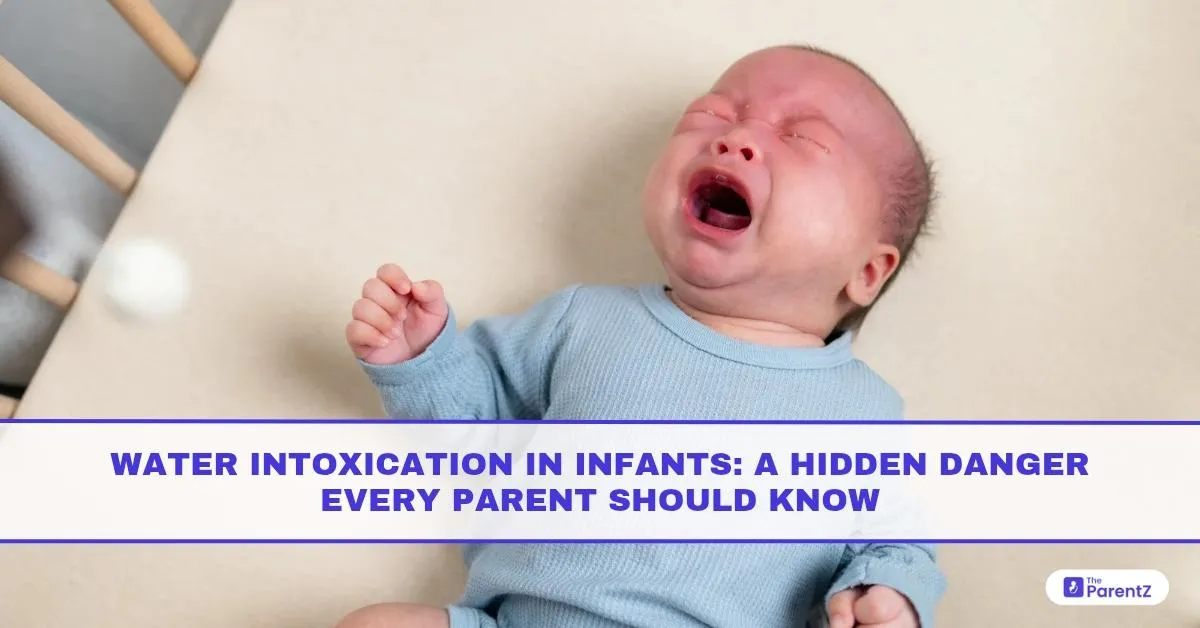Every Parent’s Wish: To Keep Their Baby Safe and Nourished
From the moment your baby is born, your instincts revolve around protection, keeping them warm, fed, and healthy. Naturally, water feels like one of the purest, safest things you could offer. After all, we’re often told to drink more water for health, so why wouldn’t that apply to your baby?
But here’s what most parents don’t know: too much water, too soon, can be dangerous for infants. It’s a condition called water intoxication, and while uncommon, it can quickly become a medical emergency.
What Is Water Intoxication?
Water intoxication, or dilutional hyponatremia, occurs when a baby drinks too much water, diluting the sodium levels in their blood. Sodium is essential for maintaining fluid balance in the body. When the balance shifts, it causes the body’s cells, including brain cells, to swell. This swelling can lead to seizures, brain damage, or even death if not treated urgently.
Infants under 6 months are especially vulnerable because:
- Their kidneys are immature and cannot effectively handle excess water.
- Their tiny bodies have a lower threshold for disruptions in fluid balance.
- They rely entirely on breast milk or formula, which already provides the hydration and electrolytes they need.
Why It Happens: Common Triggers of Water Intoxication in Infants
1. Diluted Formula Preparation
Parents may accidentally add too much water when mixing formula, trying to stretch a can of powder, or out of a misunderstanding. This is one of the most common causes of water intoxication in babies.
Real Case Insight:
In a Pediatrics journal article (PMID: 8470563), researchers reported a case of a 4-month-old infant who developed seizures after being fed over-diluted formula during financial hardship. The child recovered after hospitalization and correction of sodium levels, but the case highlighted how easily the danger can be missed.
2. Offering Water Directly
Some caregivers, especially in hot climates, may give plain water to babies to “cool them down” or “quench thirst.” While well-meaning, it’s unnecessary and risky before six months.
Dr. Manisha Desai, pediatrician from Gujarat, shares:
“We see cases where families think they’re doing good by offering boiled water to newborns in summer. One child came in with drowsiness and twitching, classic signs of water intoxication. Thankfully, the parents acted quickly.”
3. Use of Water-Based Remedies
Herbal water, gripe water, or other liquid-based traditional remedies can also contribute, especially when given frequently or in large quantities.
4. Water Play or Bathing Accidents
Though rare, water intoxication can also happen if a baby swallows large amounts of water during swimming or bath time, especially during submersion.
How Much Water Is Too Much?
For infants under 6 months:
- No additional water is needed beyond breast milk or formula.
- Even a few ounces (30–60 ml) of water can cause a significant imbalance in a newborn.
- For babies over 6 months, water should still be limited to a few sips unless advised otherwise by a pediatrician.
Warning Signs: Symptoms of Water Intoxication in Babies
Recognizing the signs early is crucial. Symptoms may appear gradually or suddenly.
- Unusual sleepiness or lethargy
- Low body temperature
- Puffy face or swollen limbs
- Seizures or twitching
- Irritability followed by drowsiness
- Vomiting
- Trouble breathing
- Wetting more than usual or suddenly very dilute, clear urine
If your baby shows any of these signs and you suspect excess water intake, seek emergency medical care immediately.
What Happens in the Body During Water Intoxication?
Let’s break it down simply:
- Excess water is consumed.
- Sodium in the blood becomes diluted.
- Water moves into cells to balance sodium concentration.
- Brain cells swell, leading to pressure in the skull.
- This pressure triggers symptoms like seizures, drowsiness, or even coma.
It’s not the water itself that is toxic; it’s the imbalance it causes in the baby’s delicate system.
Myths vs. Facts
Myth 1: Babies need water in hot weather to stay hydrated.
Fact: Breast milk (88% water) and formula provide all the hydration your baby needs—even in very hot climates. Feed more frequently if needed.
Myth 2: A little extra water in the formula won’t hurt.
Fact: Even small errors in dilution can harm a baby. Always follow the manufacturer’s instructions exactly.
Myth 3: Gripe water is natural and safe.
Fact: Gripe water may contain water, sugar, or even alcohol. It’s not regulated in many countries and can disrupt feeding and electrolyte balance.
Safe Hydration Guidelines for Babies
0–6 Months:
- No water. Only breast milk or infant formula.
- Feed more often during hot weather, growth spurts, or illness.
- If your baby seems thirsty, offer a feed, not water.
6–12 Months:
- Small sips of water (about 60–120 ml per day), especially with meals.
- Continue regular milk feeds.
- Use boiled and cooled water until your child is 1 year old.
After 1 Year:
- Toddlers can begin drinking water freely, guided by thirst.
- Avoid sugary drinks and juices.
What To Do If You Suspect Water Intoxication
- Stop all water intake immediately.
- Do not wait to see if symptoms improve.
- Take your baby to the nearest emergency department.
Emergency Tip:
Call your pediatrician on the way or clearly explain your water intake history to the emergency staff. It will help them act faster.
Prevention: What Every Parent Can Do
- Always mix the formula precisely as instructed. Don’t guess or dilute to “make it last longer.” Proper proportions are medically essential.
- Educate family members. Grandparents or helpers might unknowingly give water. Explain the risks and show them trusted pediatric guidelines.
- Stick to trusted sources. Consult advice from pediatricians, the World Health Organization (WHO), or the International Association of Pediatrics (IAP). Avoid home remedies unless approved.
- Watch fluid intake during baths or swimming. Don’t submerge your baby’s head or let them drink bathwater during play.
Final Thoughts: Trust Nature’s Design
Your baby’s body is marvelously designed. In the first six months, everything they need, nutrition, hydration, and immunity, comes from breast milk or formula. Adding water, though well-intended, can tip the balance in dangerous ways.
Water intoxication may be rare, but awareness is powerful. With just a bit of knowledge, you can avoid this hidden danger and focus on what matters most: feeding, bonding, and watching your baby grow strong and safe.






Be the first one to comment on this story.